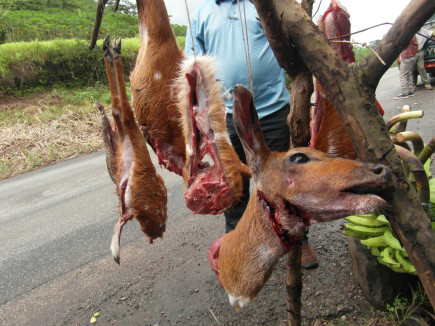
Recent statistics on the production and consumption of meat and dairy products in Cameroon indicate that some 81,680 tons of poultry meat, 84,703 tons of beef, and 31,961 tons of pork were consumed in Cameroon in 2016. This rate of meat consumption has a multiplier effect on inducing climate change. Besides bringing about a significant increase in the tons of carbon dioxide produced from fossil fuels, the large-scale meat consumption often motivates pastoralists to increase the number of cattle to meet up with existing demand. The result of this has been bush burning to get fresh pasture for their ever-increasing cattle population. Bush fire and cattle, allowed to move freely, destroy crops, plants, and forest patches which could absorb tons of carbon dioxide.
Speaking with the Mayor of Fonfuka Council in the North West Region, Mr. Philip Gwe, recently, he explained how pastoralists have thwarted efforts in fighting climate change efforts within his municipality. “Last year, we had funds from the Ministry of Forestry and Wildlife and planted some trees in to fight climate change, but these graziers intentionally set a fire, which burnt these trees and part of the Kimbi Fongum National Park, to increase grazing space. In other countries, graziers keep a good number of cattle in a small piece of land but here, our own graziers want to occupy the whole area,” he lamented.
This has been compounded by an ever-increasing consumption of wildlife species including but not limited to gorillas, chimpanzees and other primates, elephants, antelopes, monkeys, fruit bats, porcupines, and other rodents, who are major actors in fighting climate change. Many rural communities in Cameroon continue to hunt these species for subsistence, and as a source of protein, at a rate that is shocking, even to government officials. “We see people selling bush meat everywhere; in public places, along the roadsides etc., it’s more or less putting a shame on our dignity and our commitment to fight illegal poaching,” said Elvis Ngolle Ngolle, one time Minister OF Forestry and Wildlife.
Though a great source of income, the killing of these animals has a heavy toll on the fight against climate change. “Most of these animals in wild eat a lot of fruit, and through their scavenging disperse the seeds, which eventually germinate. They are also some trees that only germinate after going through the stomach of these animals. I don’t know what is in their stomach but these trees grow up and dominate the forest, serving as a carbon sink and reducing the adverse effect of climate change,” Mr. Nkeng Rudolf, a Geography Teacher in one of the forest communities in the Lebialem Division-South West Cameroon disclosed in an interview recently.
The increasing consumption of meat and wildlife species is, therefore, a great contributor to the ugly face of climate change that Cameroon is seeing today. The magnitude and recurrence of climate change induced disaster like floods and landslide within the last decade consumed thousands of lives and properties. The most recent is the July 2018 widespread flood and landslide in the coastal town of Limbe that killed at least five burying houses, livestock, and other valuable resources. To reverse this plight, there is an urgent need to find the best strategies to adapt and or mitigate climate change and impact in the country.
While enormous efforts have been made by the Cameroon Government to reverse this plight including her pledged to reduced emission by 32 % by 2035, increasing creation of forests reserves and national parks, and most recently pledge to restore over 12 million hectares of deforested and degraded land by 2030 as part of the Bonn challenge Initiative amongst others, meat consumption remains a perilous but neglected maggot thwarting every effort to fight against climate change all together.
There is, therefore, an urgent need to put in a place a mechanism that will induce a reduction in the production and consumption of meat an in Cameroon, and bring about a positive future for climate change. This can commence by sensitizing and tilting the attention of Cameroonians towards the consumption of alternative sources of proteins like soya beans milk, mushrooms, and other products with almost the same nutritive value. Improving animal diets by farmers could equally be of great help. Also, putting in place and ensuring the effective implementation of policies forbidding bush burning for grazing and hunting by pastoralists and forests communities respectively, will serve as a bold step towards the fight against climate change. Without the putting in place of such measures, then the reduction of emission by 32% by 2035 as pledged in CoP21, will remain a far-fetched. Meanwhile, climate change impact and induced disasters will continue to proliferate.
By B. Shancho Ndimuh







